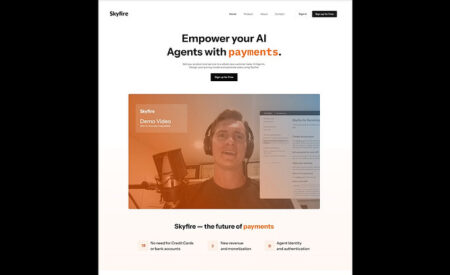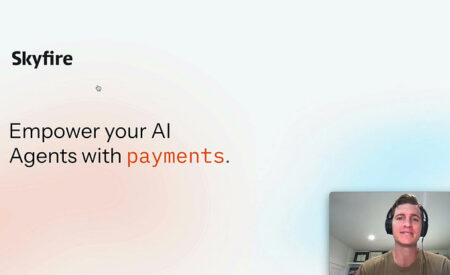Your next million users probably won’t be humans.
AI Agents as Customers: The Future of Software Sales
If you’re selling software today, there’s a good chance your next million users won’t be humans. AI agents are transforming the way software needs to be sold.
In the rapidly evolving world of artificial intelligence, a groundbreaking shift is taking place: AI agents are becoming customers. These autonomous entities, driven by sophisticated algorithms and large language models (LLMs), are beginning to engage with the world in ways that were once exclusively human.
One of the most overlooked transformative aspects for software businesses is the opportunity to sell to AI agents as a brand new customer base. This shift demands a new approach to how services are accessed and paid for, heralding an era where AI agents autonomously fulfill their requirements without human intervention.
What AI Agents Need to Pay For
AI agents will require access to a diverse array of services on-demand, each critical for their operation and effectiveness. Companies that can actively court agents will be able to proactively lean into the fundamental technological changes that AI brings.
If you’re in one of these industries, you need to evaluate how you can sell into AI agents as a brand new customer base.
Here are some key categories Agents will pay for first:
-
Access to Large Language Models (LLMs):
-
Definition: LLMs are advanced machine learning models that can understand and generate human-like text, enabling AI agents to make decisions, generate content, and interact with users.
-
Examples:
-
OpenAI: Leading with models like GPT-3 and GPT-4.
-
Perplexity: Specializing in complex text understanding and generation.
-
Anthropic: Prioritizing safety and ethical considerations in AI.
-
OpenRouter: Aggregator of 100s of LLM currently selling to AI agents through a partnership with Skyfire.
-
Other examples of providers in this space are: Google, Microsoft, Meta Ai, AI21.
-
-
-
Technical Infrastructure:
-
Definition: AI agents need robust infrastructure to host themselves and access compute power dynamically, scaling up or down as required without human intervention.
-
Examples:
-
Amazon Web Services (AWS): Comprehensive cloud computing services.
-
Akash: Decentralized cloud computing marketplace.
-
Microsoft Azure, Google Cloud Platform, IBM Cloud, DigitalOcean, Oracle Cloud Infrastructure, Linode, Vultr, Rackspace, Equinix Metal.
-
-
-
Data Platforms:
-
Definition: Access to vast datasets is crucial for AI agents to enhance their knowledge and decision-making capabilities.
-
Examples:
-
Snowflake: Cloud-based data warehousing.
-
Databricks: Unified data analytics platform.
-
Pinecone: Vector database for machine learning applications.
-
Mostly AI, Tonic.ai: Synthetic data generation.
-
DataRobot, Alteryx, AWS Data Exchange, Google, Splice Machine, Crate.io, Redis Labs, Teradata.
-
-
-
Valuable Services:
-
Definition: AI agents will require a multitude of specialized services to complete their tasks efficiently. This list is almost as big as the Internet itself.
-
Examples:
-
Digital Marketing and Content Services:
-
Jasper, Opencord.ai, Marketo, Hootsuite, Canva, Contentful.
-
-
Legal and Compliance Services:
-
RocketLawyer, Compliance.ai, LexisNexis, LegalZoom.
-
-
Human Support Platforms:
-
Fiverr, Mechanical Turk, Upwork, PeoplePerHour, Guru, 99designs, Toptal, PaymanAI.
-
-
Digital Media Services:
-
Getty Images, Shutterstock, Adobe Stock, iStock, Pond5, Envato Elements.
-
-
Cloud Communication Services:
-
Twilio, Klaviyo, SendGrid, MessageBird, Plivo, Nexmo.
-
-
The list goes on…
-
-
-
Other AI Agents:
-
Definition: AI agents will often require the services of other AI agents to complete specific tasks, creating a new market for inter-agent transactions.
-
Examples:
-
Developer-Created One-Off Agents: Custom data scrapers, niche content generators.
-
Agent Orchestration and Tooling Platforms: Composio (Skyfire user), LangChain, Boto.io (Skyfire user), instrumentation like AgentOps.
-
Personal Assistant AI Agents: Built by Zeta Labs, Replika, x.ai.
-
Voice Interaction AI Agents: Hemingway, Voiceflow, Alan AI.
-
Data Analysis and Reporting Agents: Narrative Science, DataRobot, Tableau.
-
Financial Transaction Agents: Aider, Brex, Divvy.
-
Customer Support AI Agents: DigitalGenius, Ada Support, Kustomer.
-
Marketing and Sales AI Agents: Conversica, Drift, HubSpot.
-
Logistics and Supply Chain AI Agents: Llamasoft, Project44.
-
Healthcare and Medical AI Agents: Arterys, Babylon Health, Olive AI.
-
Educational AI Agents: Squirrel AI, Coursera for Business, Khan Academy.
-
Environmental Monitoring AI Agents: BreezoMeter, Aclima, EarthSense.
-
Security and Surveillance AI Agents: Deep Sentinel, Verkada, Camio.
-
-
Here’s a demo of an AI Agent making payments to services on demand:
Conclusion
The rise of AI agents as customers won’t just be a technological advancement; it will represent a fundamental shift in how services are accessed and paid for. Skyfire has enabled AI agents to autonomously manage their finances and make payments. These new AI Agent capabilities have created the opportunity for brand new business models that will transform how software is sold. As businesses adapt to this new reality, those first embrace AI agents as customers will have a substantial advantage over their competition.



